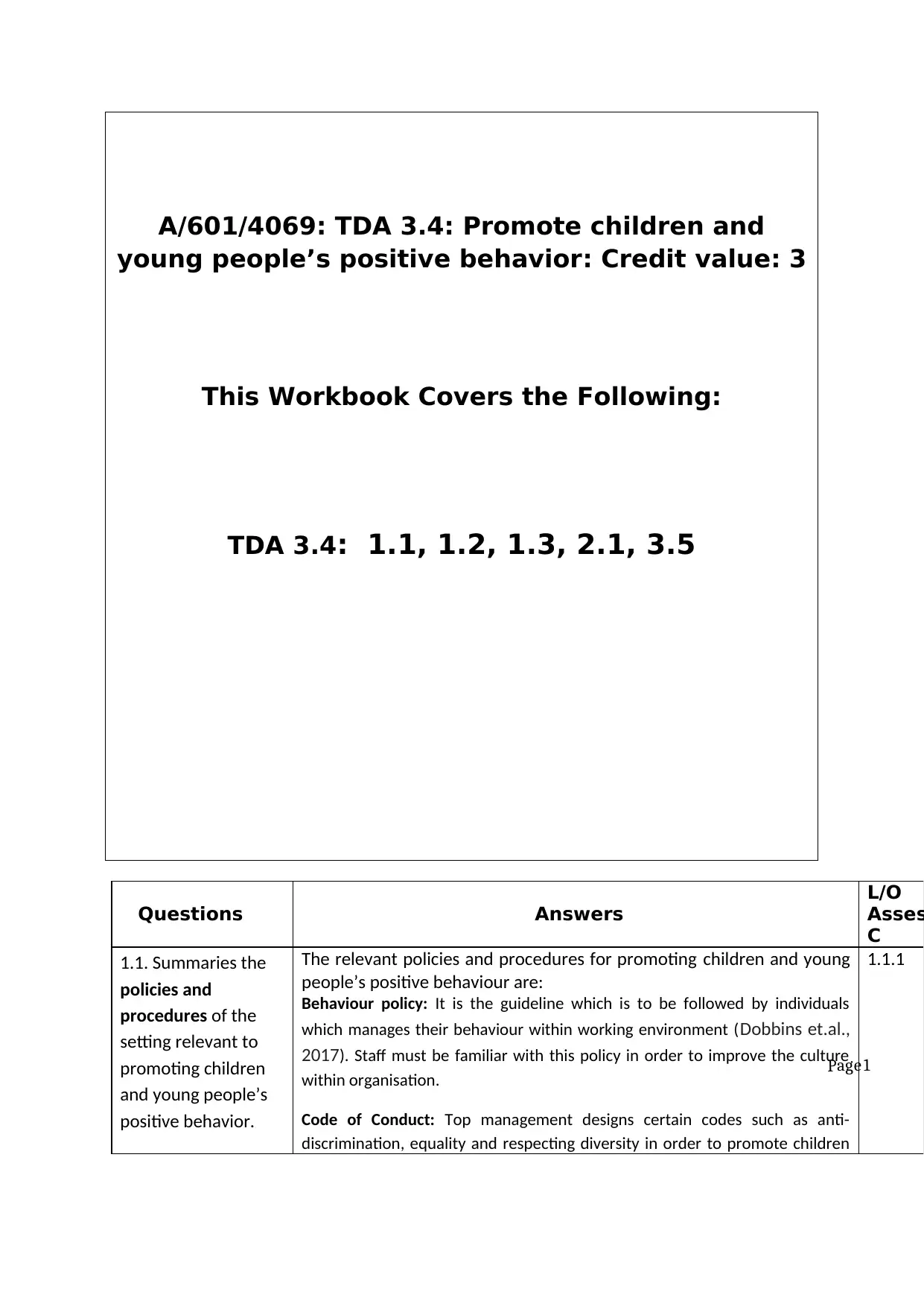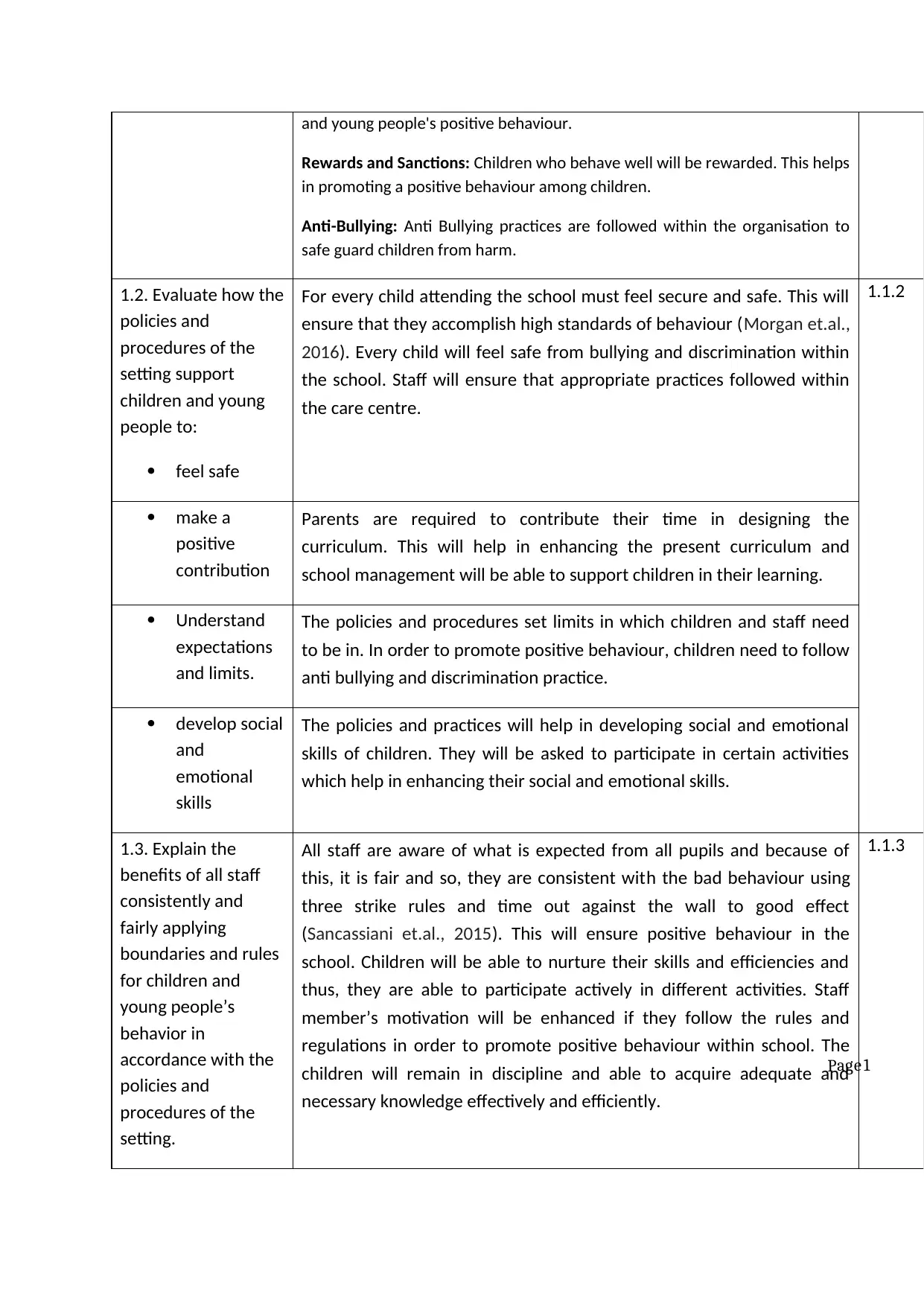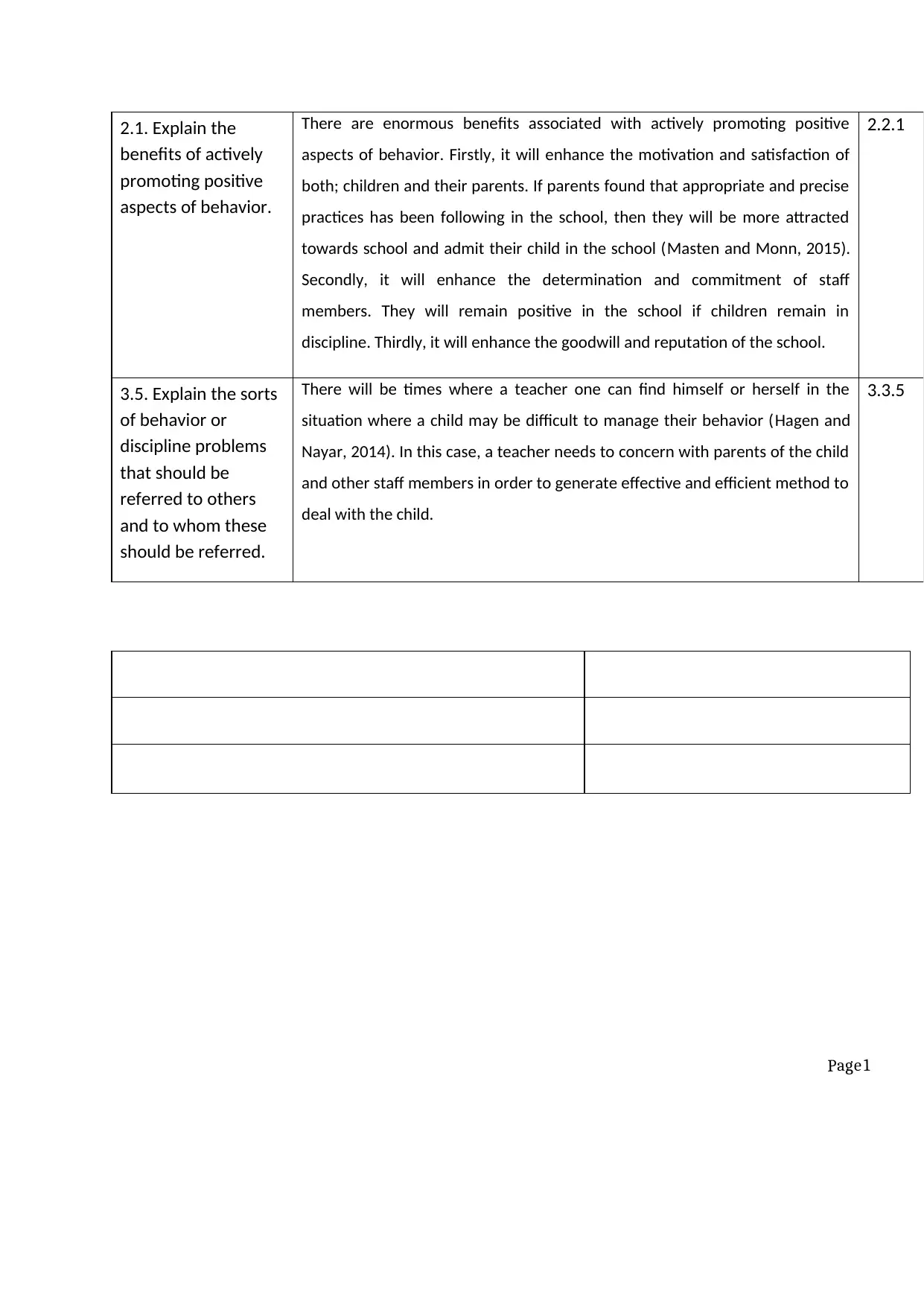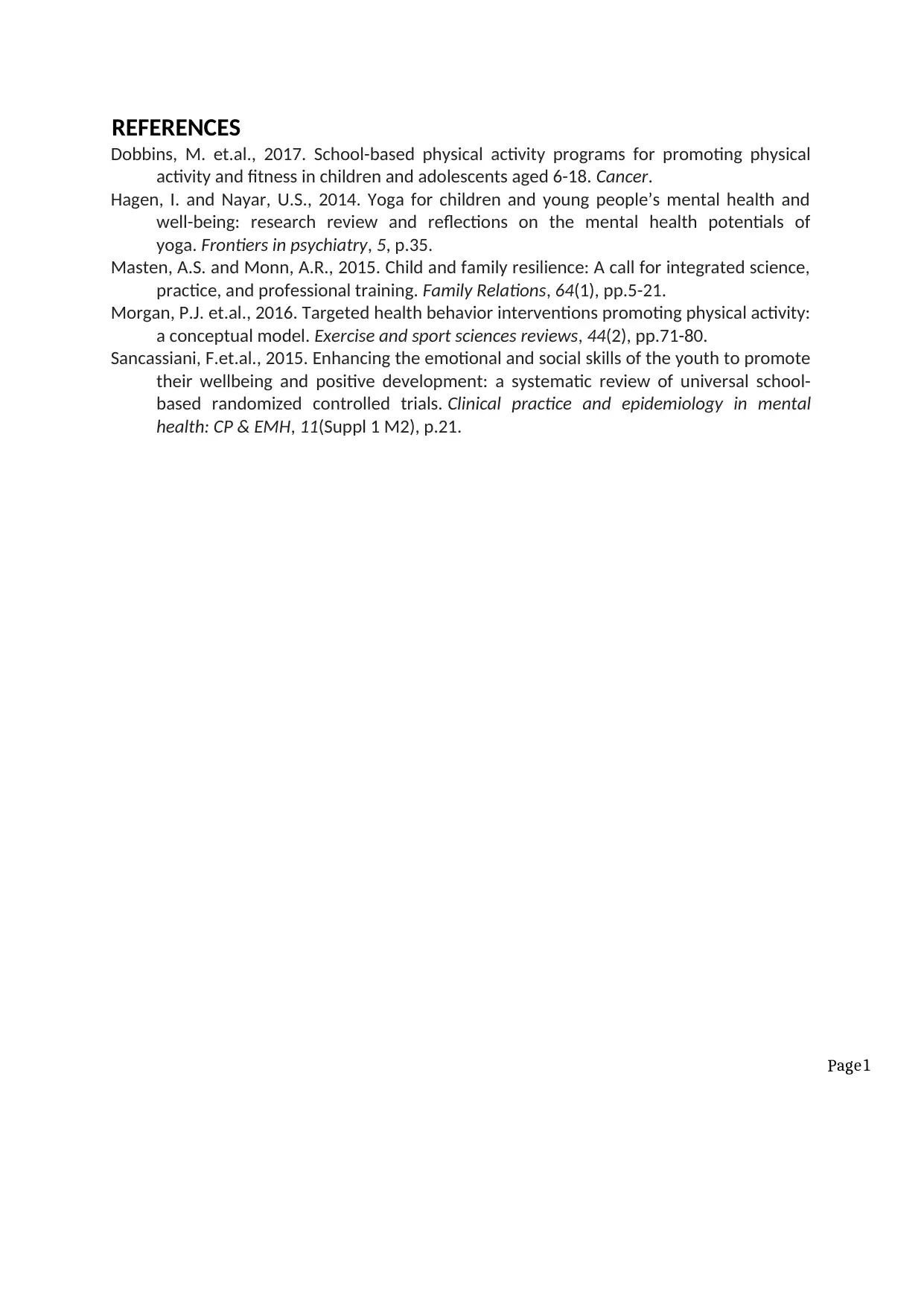A/601/4069: TDA 3.4: Promote Children and Young People's Behavior
VerifiedAdded on 2020/10/05
|4
|1117
|243
Homework Assignment
AI Summary
This document is a solution to the TDA 3.4 assignment, focusing on promoting positive behavior in children and young people. It covers relevant policies and procedures, including behavior policies, codes of conduct, rewards and sanctions, and anti-bullying practices. The assignment evaluates how these policies support children in feeling safe, making positive contributions, understanding expectations, and developing social and emotional skills. It also explains the benefits of consistently applying boundaries and rules, as well as the benefits of actively promoting positive aspects of behavior. The document addresses behavior or discipline problems that should be referred to others and to whom these referrals should be made. The solution references various academic sources to support its arguments.

Page1
A/601/4069: TDA 3.4: Promote children and
young people’s positive behavior: Credit value: 3
This Workbook Covers the Following:
TDA 3.4: 1.1, 1.2, 1.3, 2.1, 3.5
Questions Answers
L/O
Asses
C
1.1. Summaries the
policies and
procedures of the
setting relevant to
promoting children
and young people’s
positive behavior.
The relevant policies and procedures for promoting children and young
people’s positive behaviour are:
Behaviour policy: It is the guideline which is to be followed by individuals
which manages their behaviour within working environment (Dobbins et.al.,
2017). Staff must be familiar with this policy in order to improve the culture
within organisation.
Code of Conduct: Top management designs certain codes such as anti-
discrimination, equality and respecting diversity in order to promote children
1.1.1
A/601/4069: TDA 3.4: Promote children and
young people’s positive behavior: Credit value: 3
This Workbook Covers the Following:
TDA 3.4: 1.1, 1.2, 1.3, 2.1, 3.5
Questions Answers
L/O
Asses
C
1.1. Summaries the
policies and
procedures of the
setting relevant to
promoting children
and young people’s
positive behavior.
The relevant policies and procedures for promoting children and young
people’s positive behaviour are:
Behaviour policy: It is the guideline which is to be followed by individuals
which manages their behaviour within working environment (Dobbins et.al.,
2017). Staff must be familiar with this policy in order to improve the culture
within organisation.
Code of Conduct: Top management designs certain codes such as anti-
discrimination, equality and respecting diversity in order to promote children
1.1.1
Paraphrase This Document
Need a fresh take? Get an instant paraphrase of this document with our AI Paraphraser

Page1
and young people's positive behaviour.
Rewards and Sanctions: Children who behave well will be rewarded. This helps
in promoting a positive behaviour among children.
Anti-Bullying: Anti Bullying practices are followed within the organisation to
safe guard children from harm.
1.2. Evaluate how the
policies and
procedures of the
setting support
children and young
people to:
feel safe
For every child attending the school must feel secure and safe. This will
ensure that they accomplish high standards of behaviour (Morgan et.al.,
2016). Every child will feel safe from bullying and discrimination within
the school. Staff will ensure that appropriate practices followed within
the care centre.
1.1.2
make a
positive
contribution
Parents are required to contribute their time in designing the
curriculum. This will help in enhancing the present curriculum and
school management will be able to support children in their learning.
Understand
expectations
and limits.
The policies and procedures set limits in which children and staff need
to be in. In order to promote positive behaviour, children need to follow
anti bullying and discrimination practice.
develop social
and
emotional
skills
The policies and practices will help in developing social and emotional
skills of children. They will be asked to participate in certain activities
which help in enhancing their social and emotional skills.
1.3. Explain the
benefits of all staff
consistently and
fairly applying
boundaries and rules
for children and
young people’s
behavior in
accordance with the
policies and
procedures of the
setting.
All staff are aware of what is expected from all pupils and because of
this, it is fair and so, they are consistent with the bad behaviour using
three strike rules and time out against the wall to good effect
(Sancassiani et.al., 2015). This will ensure positive behaviour in the
school. Children will be able to nurture their skills and efficiencies and
thus, they are able to participate actively in different activities. Staff
member’s motivation will be enhanced if they follow the rules and
regulations in order to promote positive behaviour within school. The
children will remain in discipline and able to acquire adequate and
necessary knowledge effectively and efficiently.
1.1.3
and young people's positive behaviour.
Rewards and Sanctions: Children who behave well will be rewarded. This helps
in promoting a positive behaviour among children.
Anti-Bullying: Anti Bullying practices are followed within the organisation to
safe guard children from harm.
1.2. Evaluate how the
policies and
procedures of the
setting support
children and young
people to:
feel safe
For every child attending the school must feel secure and safe. This will
ensure that they accomplish high standards of behaviour (Morgan et.al.,
2016). Every child will feel safe from bullying and discrimination within
the school. Staff will ensure that appropriate practices followed within
the care centre.
1.1.2
make a
positive
contribution
Parents are required to contribute their time in designing the
curriculum. This will help in enhancing the present curriculum and
school management will be able to support children in their learning.
Understand
expectations
and limits.
The policies and procedures set limits in which children and staff need
to be in. In order to promote positive behaviour, children need to follow
anti bullying and discrimination practice.
develop social
and
emotional
skills
The policies and practices will help in developing social and emotional
skills of children. They will be asked to participate in certain activities
which help in enhancing their social and emotional skills.
1.3. Explain the
benefits of all staff
consistently and
fairly applying
boundaries and rules
for children and
young people’s
behavior in
accordance with the
policies and
procedures of the
setting.
All staff are aware of what is expected from all pupils and because of
this, it is fair and so, they are consistent with the bad behaviour using
three strike rules and time out against the wall to good effect
(Sancassiani et.al., 2015). This will ensure positive behaviour in the
school. Children will be able to nurture their skills and efficiencies and
thus, they are able to participate actively in different activities. Staff
member’s motivation will be enhanced if they follow the rules and
regulations in order to promote positive behaviour within school. The
children will remain in discipline and able to acquire adequate and
necessary knowledge effectively and efficiently.
1.1.3

Page1
2.1. Explain the
benefits of actively
promoting positive
aspects of behavior.
There are enormous benefits associated with actively promoting positive
aspects of behavior. Firstly, it will enhance the motivation and satisfaction of
both; children and their parents. If parents found that appropriate and precise
practices has been following in the school, then they will be more attracted
towards school and admit their child in the school (Masten and Monn, 2015).
Secondly, it will enhance the determination and commitment of staff
members. They will remain positive in the school if children remain in
discipline. Thirdly, it will enhance the goodwill and reputation of the school.
2.2.1
3.5. Explain the sorts
of behavior or
discipline problems
that should be
referred to others
and to whom these
should be referred.
There will be times where a teacher one can find himself or herself in the
situation where a child may be difficult to manage their behavior (Hagen and
Nayar, 2014). In this case, a teacher needs to concern with parents of the child
and other staff members in order to generate effective and efficient method to
deal with the child.
3.3.5
2.1. Explain the
benefits of actively
promoting positive
aspects of behavior.
There are enormous benefits associated with actively promoting positive
aspects of behavior. Firstly, it will enhance the motivation and satisfaction of
both; children and their parents. If parents found that appropriate and precise
practices has been following in the school, then they will be more attracted
towards school and admit their child in the school (Masten and Monn, 2015).
Secondly, it will enhance the determination and commitment of staff
members. They will remain positive in the school if children remain in
discipline. Thirdly, it will enhance the goodwill and reputation of the school.
2.2.1
3.5. Explain the sorts
of behavior or
discipline problems
that should be
referred to others
and to whom these
should be referred.
There will be times where a teacher one can find himself or herself in the
situation where a child may be difficult to manage their behavior (Hagen and
Nayar, 2014). In this case, a teacher needs to concern with parents of the child
and other staff members in order to generate effective and efficient method to
deal with the child.
3.3.5
⊘ This is a preview!⊘
Do you want full access?
Subscribe today to unlock all pages.

Trusted by 1+ million students worldwide

Page1
REFERENCES
Dobbins, M. et.al., 2017. School-based physical activity programs for promoting physical
activity and fitness in children and adolescents aged 6-18. Cancer.
Hagen, I. and Nayar, U.S., 2014. Yoga for children and young people’s mental health and
well-being: research review and reflections on the mental health potentials of
yoga. Frontiers in psychiatry, 5, p.35.
Masten, A.S. and Monn, A.R., 2015. Child and family resilience: A call for integrated science,
practice, and professional training. Family Relations, 64(1), pp.5-21.
Morgan, P.J. et.al., 2016. Targeted health behavior interventions promoting physical activity:
a conceptual model. Exercise and sport sciences reviews, 44(2), pp.71-80.
Sancassiani, F.et.al., 2015. Enhancing the emotional and social skills of the youth to promote
their wellbeing and positive development: a systematic review of universal school-
based randomized controlled trials. Clinical practice and epidemiology in mental
health: CP & EMH, 11(Suppl 1 M2), p.21.
REFERENCES
Dobbins, M. et.al., 2017. School-based physical activity programs for promoting physical
activity and fitness in children and adolescents aged 6-18. Cancer.
Hagen, I. and Nayar, U.S., 2014. Yoga for children and young people’s mental health and
well-being: research review and reflections on the mental health potentials of
yoga. Frontiers in psychiatry, 5, p.35.
Masten, A.S. and Monn, A.R., 2015. Child and family resilience: A call for integrated science,
practice, and professional training. Family Relations, 64(1), pp.5-21.
Morgan, P.J. et.al., 2016. Targeted health behavior interventions promoting physical activity:
a conceptual model. Exercise and sport sciences reviews, 44(2), pp.71-80.
Sancassiani, F.et.al., 2015. Enhancing the emotional and social skills of the youth to promote
their wellbeing and positive development: a systematic review of universal school-
based randomized controlled trials. Clinical practice and epidemiology in mental
health: CP & EMH, 11(Suppl 1 M2), p.21.
1 out of 4
Related Documents
Your All-in-One AI-Powered Toolkit for Academic Success.
+13062052269
info@desklib.com
Available 24*7 on WhatsApp / Email
![[object Object]](/_next/static/media/star-bottom.7253800d.svg)
Unlock your academic potential
Copyright © 2020–2026 A2Z Services. All Rights Reserved. Developed and managed by ZUCOL.





